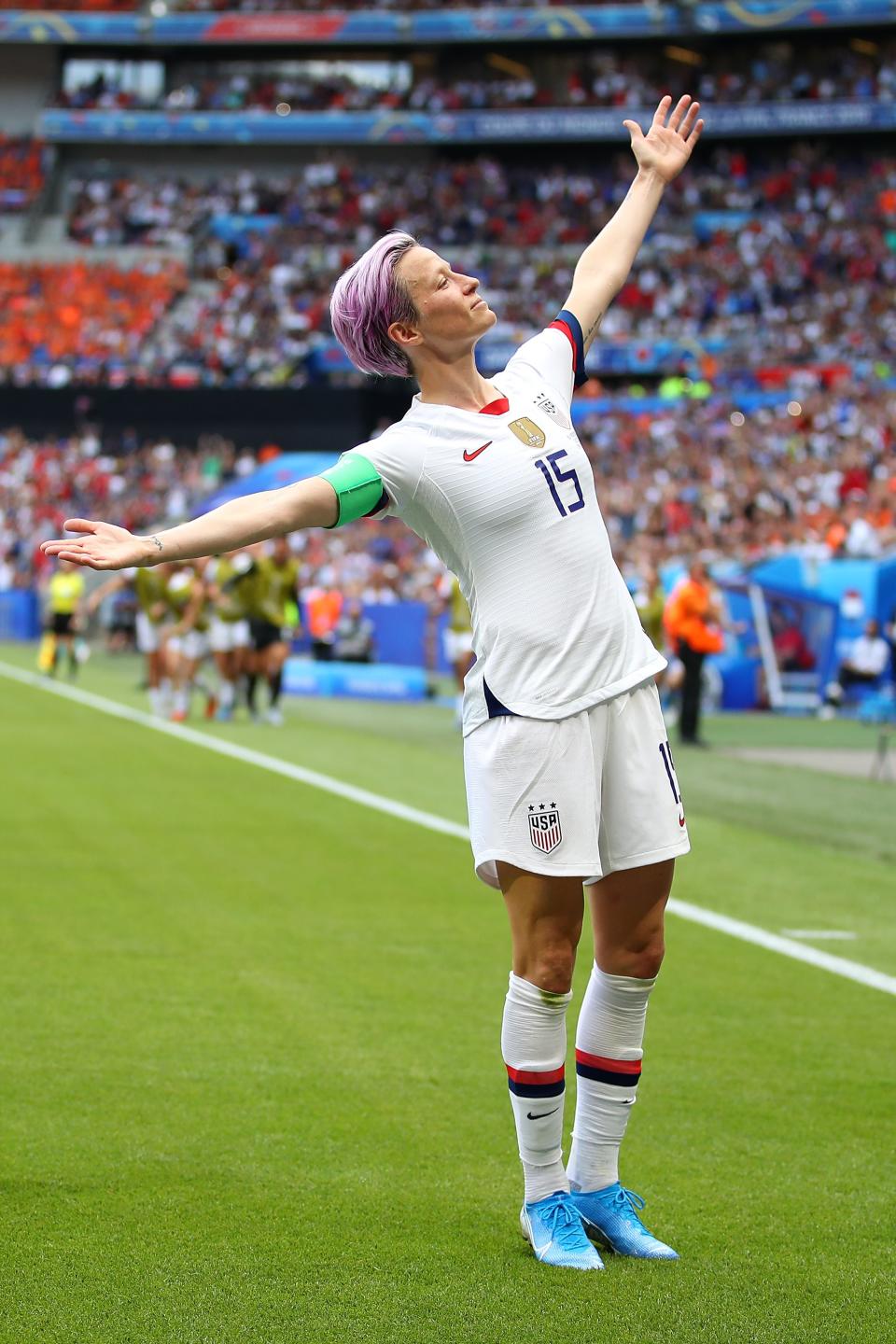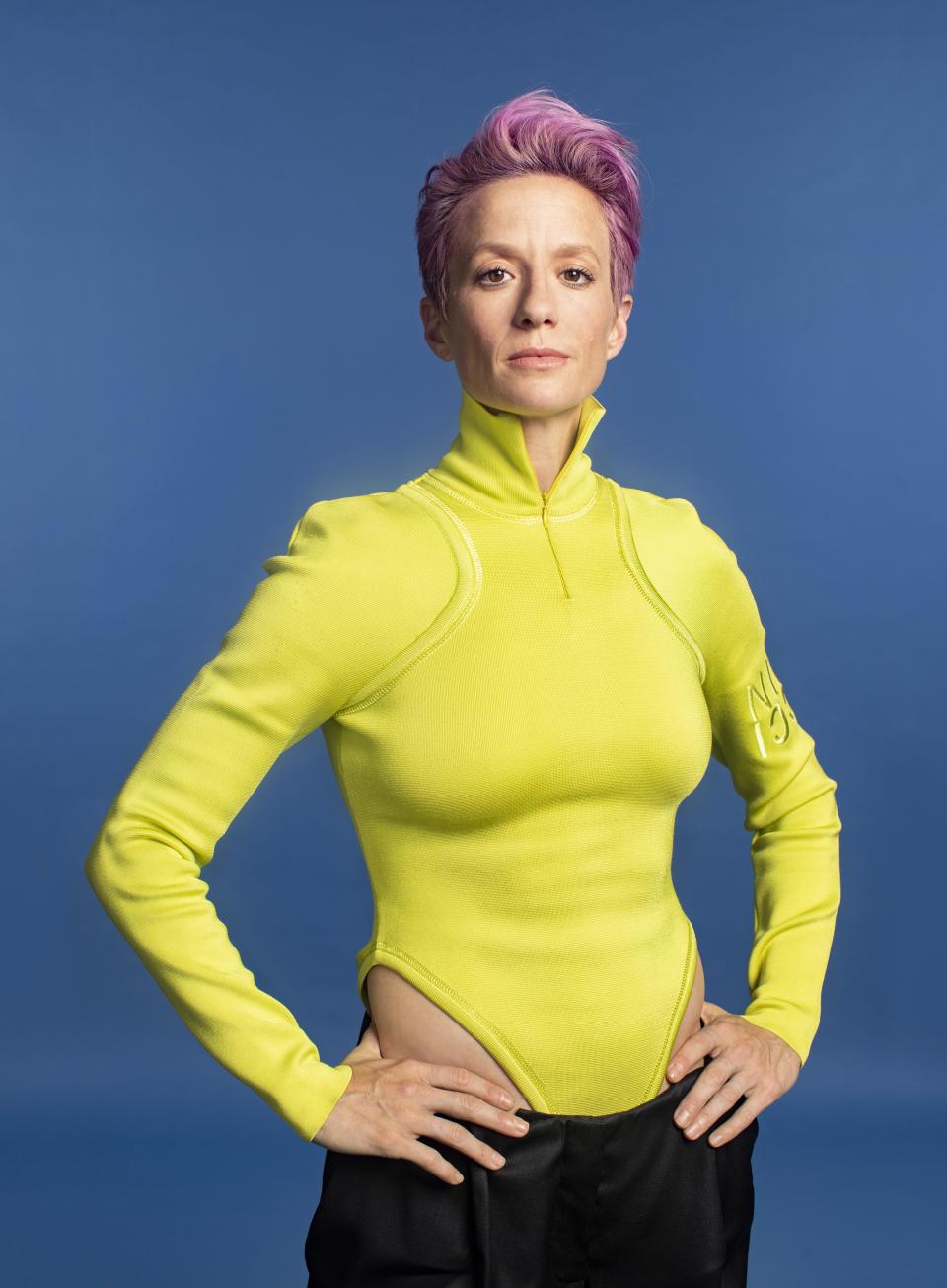She Scored. She Won. She’s Going to Get Us All Paid Better
Megan Rapinoe, queen of big energy, is tired. She seems pissed, in fact. Understandable, considering she’s been up since 4 a.m., doing a round of morning-show interviews in response to the unexpected implosion of mediation between the World Cup champions and the United States Soccer Federation (USSF) over the team’s fight for equal pay.
It’s been a busy summer for the soccer player: She won the Golden Boot award, for scoring the most goals during the World Cup (and was dragged, by some, for celebrating them); won the Golden Ball award, for best player in the World Cup (and was slammed for then using her platform to speak out on social issues); became a living icon for proclaiming, “I deserve this,” while holding a bottle of Champagne; became the first out gay woman to pose for Sports Illustrated’s Swimsuit Issue; and fought tirelessly to keep the issue of women’s equality in the news. All while having what looks like a damn good time.
But today the atmosphere is somber, the happy chaos of her Champagne-drenched victory tour conspicuously absent. “Everything is awesooome,” she sings sarcastically as a makeup artist removes her caked-on TV makeup in preparation for her Women of the Year photo shoot. Over the past three years, the U.S. Women’s National Team’s fight for equal pay has become a saga that’s captured the we’ve-had-enough mood of women across the country. On International Women’s Day this March, after years of feeling like they weren’t getting their fair shake, the entire team sued their bosses for gender discrimination.
Four months later, when the women won this summer’s World Cup in France, the stadium erupted into a defiant chant: “Equal pay! Equal pay!” But the confetti had scarcely been swept up before the USSF hired lobbyists to plead its side to lawmakers and issued an open letter that disputed the team’s claim that they’re paid less.
Which brings us to today, the morning after mediation has broken down, with a court battle looking imminent.
“At the crux of everything is that when we play a game—win the game, lose the game, tie the game, whatever—what we’re asking is that we’ll have the same opportunity to make the same amount of money,” Rapinoe says. “We should be treated equally.”
The On-Purpose Icon
At the center of all the attention, the controversy, the tweets, is Rapinoe herself: a revolution in a five-foot-seven pink-haired package.
Before the world became obsessed, her résumé was already legendary: 50 goals, 58 assists, 158 international matches, two World Cup finals, one Olympic gold medal. Then almost overnight she went from being a moderately well-known athlete to being everywhere. This summer, in her third World Cup appearance, she tied for most goals scored: six—more than the entire U.S. Men’s National Team combined managed to score in each of their three most recent World Cup appearances.
Her epic victory lap makes one thing crystal clear: The age of women acting demure about their success is over. And it’s about time.

The same unyielding attitude that has made Rapinoe the feminist icon of the year has also made her a target. People are either begging her to run for office (“That sounds crazy and terrible,” she says) or calling her the face of everything wrong with America—brash, arrogant, privileged. No one is neutral.
“I don’t feel like a lukewarm figure,” she says with a laugh. Rapinoe really couldn’t give a shit about being liked. She is made to be memed, a natural-born headline grabber with a deep, matter-of-fact conviction often mistaken for cockiness. But the real Rapinoe is not the media frenzy that surrounds her. She is the immovable eye of the storm—the thoughtful, relentless, passionate force working her way into the center of our cultural conversation. “I’m right here in this moment,” she says, “facing it full on.”
The Advocate...And, And, And
Through all the insanity, Rapinoe has managed to own her own narrative. “She’s so confident in who she is that she’s actually able to change the way the world sees her,” says Christen Press, Rapinoe’s teammate on the USWNT and one of her partners in their new lifestyle venture, Re-Inc. “She writes her own script on her life—she decides what people think of her because she thinks it so strongly.”
What she thinks is that it’s time women—including herself—got their due. “We are always having to qualify our accomplishments,” Rapinoe says. “We always have to be like: Yes, we won, and we’re inspiring a generation, and we’re touring the country, and we’re social activists, and we’re really marketable, and, and, and!” The hate she’s gotten for celebrating is a perfect representation of the double standards that leave women wanting to pull out their hair. “We just did something amazing,” Rapinoe says. “Winning the World Cup is very difficult—it’s arduous, it’s a long cycle, it’s hard. And then on top of it, we inspired a movement that transcended the sport. Now we have to come home and fight a lawsuit to convince everyone that we’re worth a little bit more money? That’s bullshit.”
Rapinoe is among the most successful women in her field, and still her work is valued less than her male counterparts’. Despite the fact that the women are the best in the world, they are paid by the USSF only 89% of what they would be paid if they were the men’s team, according to calculations from the Washington Post. That’s barely better than the pay gap women face nationally. (The USWNT has a different pay structure than the men’s team, a key point of contention in the lawsuit. The gap exists in the maximum amount of money, including merit bonuses, each team has the opportunity to earn.) And that’s nothing compared with the pay gap in prize money—in the 2018 men’s World Cup, FIFA paid the winning team $38 million. The women split $4 million for their historic win. (For the record, the USSF supports narrowing the pay gap in FIFA prize money.)

United States of America v Netherlands : Final - 2019 FIFA Women's World Cup France
The money is just one item on Rapinoe’s list of injustices to be solved. She’s a walking rallying cry, using her platform to call attention to systemic inequalities of gender, orientation, and race. “I’m the antithesis of no fucks given—I give all the fucks,” she says. “I just feel that it’s my responsibility to make the world a better place—we all have that responsibility.”
One of the most inflammatory aspects of her activism is her protest of the national anthem. Less than two weeks after former NFL-er Colin Kaepernick refused to stand during the national anthem, Rapinoe became the first white—and first female—athlete to kneel in solidarity. “The silence of so many white athletes was shocking, frankly, and disappointing. I felt like it was my responsibility to do something,” she says. “To me nothing is in a silo. I can’t really just be like, ‘Oh hey, gay community—go us!’ I know what it means to be an ‘other,’ to be something different.”
These are sticky conversations—many of the issues Rapinoe speaks up about admittedly aren’t personal. She’s white. Rich. Successful. But she’s also committed to educating herself. “When she’s going to speak on something,” Rapinoe’s twin sister, Rachael, says, “she’s going to do her due diligence.”

The Woman on Fire
The allure of Megan Rapinoe is that she is perfectly, happily, unapologetically herself—the living, breathing antidote to the fatigue of being a woman in 2019.
Rapinoe is not simply an icon of liberalism—she’s a woman with an incredibly nuanced perspective. She’s both an out and proud gay woman and close with her Fox News–watching parents. She’s a vocal advocate for improving racial inequities while sticking by her older brother, Brian, who has spoken about his participation in a white nationalist gang while in prison. (When Rapinoe was 10, Brian was arrested for bringing meth to school and has spent most of his adult life in prison. He’s now sober and hopes sharing his story will help make a positive impact.) She owns her contradictions, refusing to be stereotyped. “When I come into the room, things are going to be talked about,” she says. “Maybe it makes people uncomfortable, but that’s not a bad thing. People need to look at themselves in the mirror and think, Why is this so uncomfortable for me?” She has no patience for rules about what a woman, a role model, “should” be. Be good, but not too good. Speak up, but remember your place. Inspire the next generation, but don’t threaten the status quo. Be iconic but relatable, confident but humble. Always, always be likable. “That’s not how you inspire people,” she says. “That’s not the kind of personality that effects change—you always have to buck up against society.”
Rapinoe is the new paradigm. “I want to be seen as a new offering of what a woman should look like—of what a woman really is,” she says. “I think so often it’s ‘Oh, she’s a really bossy woman’ or ‘She’s a powerful woman’ or ‘She’s this.’ And it’s like, ‘No. That’s just a woman.’”
It’s okay if she’s pissed. It’s okay if she’s tired. It’s okay if you think she’s too loud or too cocky or, God forbid, too unlikable. It’s okay because Megan Rapinoe knows her own voice—and she’s using it. No apologies.

Come back each day this week to read profiles of the 2019 Glamour Women of the Year honorees and get your tickets to the two-day event here.
Macaela MacKenzie is a senior editor at Glamour covering all things wellness and women.
Hair: Lacy Redway at the Wall Group; makeup: Jeanine Lobell at Home Agency. Boat: NYCbySEA
Originally Appeared on Glamour

